Meet the chief judge of the nation's most divisive, controversial and conservative appeals court
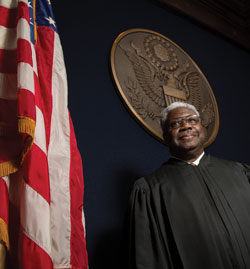
Photo of Carl Stewart by Kathy Anderson.
NEW ORLEANS – Carl Stewart has every right to be angry.
Growing up, he was forced to attend segregated schools, required to use “colored only” restrooms and water fountains, and made to sit at the back of the bus. At age 3, Stewart watched as white church leaders blocked his parents’ efforts to buy their first home because they didn’t want black people as neighbors. Retail stores refused to let him try on clothes. Customers at his first job in college routinely used the N-word in front of him.
He quietly admits that he continues to experience racial profiling, even today.
But in the eyes of many, those experiences make Stewart the perfect person to preside over the 5th U.S. Circuit Court of Appeals—one of the most controversial, rancorous, dysfunctional, staunchly conservative and important appellate courts in the country.
It is also a court with three current vacancies—President Barack Obama has announced one nomination to fill one of those slots—and there’s a strong possibility the president will have three more openings before he leaves office, leading many to predict a radical ideological change is in store.
Stewart, 64, is the first African-American chief judge of the 5th Circuit. He serves on the powerful federal Judicial Conference, is vice president of the prestigious American Inns of Court and, until recently, chaired the Federal Rules Committee. There is scant dispute that this quiet, amiable lawyer from northern Louisiana is one of the most influential federal judges in the nation.
As for the bitterness and racism that has surrounded him over the decades?
“Sticks and stones,” he quickly interjects, even before the question is fully asked.
“I don’t see why so many people even today are so bitter or always picking fights over politics or race or whatever and I refuse to play their game,” says Stewart. “People who constantly cause conflict and stress, those are unhappy people.”
The New Orleans-based 5th Circuit, which fields its appellate cases from Louisiana, Mississippi and Texas, tests Stewart’s dislike for conflict as a matter of routine. The court has before it now, or in the pipeline in the district courts below it, cases challenging gun laws, restrictions on abortions, organized prayer in public schools, affirmative action efforts by local governments, challenges under the Voting Rights Act, opposition to federal environmental regulations and enforcement efforts, disputes about the implementation of the death penalty and renewed challenges to Obamacare, not to mention review of the varied and massive BP oil spill litigations.
BUDGETARY BARRIERS
The conflict for Stewart goes far beyond hot-button social issues. His circuit oversees district courts with some of the fastest-growing populations in the country, while facing the biggest financial crisis to hit the federal court system in many decades.
Under the pressure of sequestration, he worked with the nine chief judges of the district courts to cut several million dollars from an already lean 5th Circuit budget. He combined the procurement and human resource departments of the district and bankruptcy courts. He slashed travel for judges and court staff. Slots vacated by staff pressed into early retirement are not being filled.
There will be layoffs, staff furloughs, cuts in indigent defense, reduced office hours and less public access to the public court systems.
“We were forced to work with 2006 budget levels despite increased caseloads,” Stewart says. “And we were told that it’s going to get worse. The right to counsel is caught up in this and there are some things you cannot put a price tag on.”
Stewart has also had his hands full just keeping peace at a court well-known for public controversy.
Many courts have their high-maintenance and highly vocal jurists. The 7th Circuit has Richard Posner. The 9th Circuit has Alex Kozinski. But the 5th Circuit has a plethora of Posners and Kozinskis up and down its ranks. When the defendant in a discrimination case opined that President Obama would replace the Statue of Liberty’s torch with “a piece of fried chicken,” a district judge in the 5th Circuit refused to interpret it as a racial slur.
Then there’s the long-running battle between the 5th Circuit and U.S. District Judge John McBryde of Fort Worth, a dispute that has embroiled four of Stewart’s predecessors. In 1999, McBryde sued the 5th Circuit after the court suspended him for intemperate conduct and abusive behavior toward lawyers and other judges. In 2011, McBryde sanctioned two lawyers who questioned his impartiality in an IP case. A neutral judge appointed by the 5th Circuit reviewed the order and reversed it.
And finally, there’s the simple reality that some 5th Circuit judges do not like each other, according to interviews with judges and former clerks.
Internal circuit court memos, described as “mean-spirited” and “wholly disrespectful” by other judges on the 5th Circuit, targeted Chief Judge Stewart and his decision-making on administrative matters.
While Stewart declines to discuss specifics, he doesn’t deny that he has been the target of personal attacks by some of his colleagues.
“I will say this: Words can be very hurtful and my mom taught me to not fire off the first thoughts that come to my mind and to avoid name calling,” he says. “We can disagree without getting personal and hurtful. There’s no reason to be mean-spirited.”
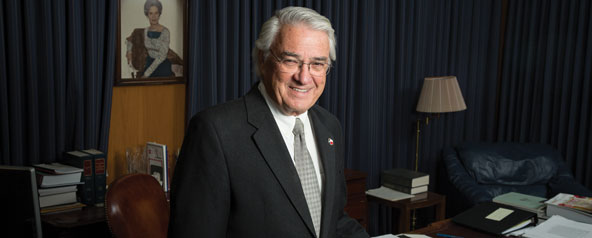
5th Circuit Judge Patrick Higginbotham, a Ronald Reagan appointee who vouches for Stewart’s even temperament. Photo by Kathy Anderson.
UNPLEASANT UNDERCURRENT
Insiders say that even the timing of Stewart’s elevation to chief judge in October 2012 was partially the result of ill will among the judges. Judge Edith Jones, his predecessor, resigned three months early to allow Judge Priscilla Owen a chance to become chief judge after Stewart. Owen would have been 65 by the time Stewart’s term ends in 2019, and thus ineligible, if Jones had served her full term. By resigning early, Jones can prevent Judge Jennifer Elrod—of whom she has been critical—from succeeding Stewart.
Shortly after becoming circuit chief, Stewart was forced to handle a disciplinary complaint against Jones over racially charged remarks she made during a public appearance at the University of Pennsylvania. Later, Stewart removed Jones from a death penalty case after lawyers complained about inappropriate, biased comments she had made in public about the case.
But Stewart’s quiet attention to such controversies earns kudos from many of his colleagues.
“The annual 5th Circuit Judicial Conference was so much more relaxed and comfortable this year with Carl in charge,” says recently retired U.S. District Judge Royal Furgeson. “The lawyers and judges felt we were walking on needles the past few years because everything was so uptight and tense.”
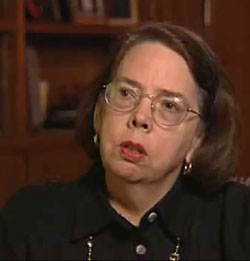
Judge Carolyn King: “Carl [Stewart] does not ever initiate controversy. Carl doesn’t have an angry or overtly aggressive bone in his body, which is incredible, especially when dealing with fellow judges who can be very high-maintenance.”
“Yes, we’ve had some controversy around here,” says Stewart. “We deal with it and we move on.”
Some of his colleagues, as well as appellate law experts who follow the 5th Circuit, say Stewart has not only weathered the controversies generated during his brief tenure, but also is helping the circuit court repair deep bruises to its reputation.
“This court needs a leader who is smart, hardworking, thoughtful, nonpartisan, patient and very even-tempered, and Carl uniquely possesses all those characteristics,” says Judge Patrick Higginbotham, who has served on the 5th Circuit since President Ronald Reagan appointed him in 1982.
“Carl will not abuse his power,” says Higginbotham. “He gives judges time to ask questions and to make their positions and he doesn’t cut them off, even when they have views that are contrary to his own.”
“He doesn’t bring a partisan bias to cases and he doesn’t react to others trying to provoke him—and believe me, those efforts are there,” he says.
Judge Carolyn King served as chief judge of the 5th Circuit from 1999 to 2006. King says a lifetime of dealing with personal obstacles has made Stewart uniquely qualified—in substance and temperament—to lead the court at this point in time.
“Because Carl has experienced and personally witnessed so much in his life, he has a better grasp of what is important than the rest of us,” King says. “Carl does not ever initiate controversy. Carl doesn’t have an angry or overtly aggressive bone in his body, which is incredible, especially when dealing with fellow judges who can be very high-maintenance and get angry over the littlest things.”
Adds Higginbotham, “Carl’s entire life has been preparing him for this position.”
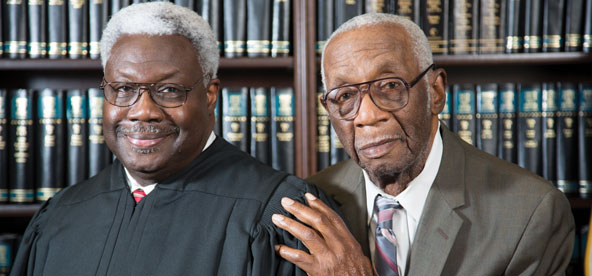
Stewart with his father, Richard, who encouraged Carl and his brothers to travel, play sports and read extensively when they were growing up. Photo by Kathy Anderson.
HUMBLE PERSEVERANCE
Carl E. Stewart was born in 1950 in Shreveport, La. His father, now 88, is a World War II veteran who worked most of his life as a letter carrier for the U.S. Postal Service. His mother, who died in 1978, was a domestic worker. One grandfather was a Pullman porter on the train from New Orleans to Kansas City, shining shoes and making beds. The other grandfather was a sharecropper.
“My grandparents and parents were God-fearing people,” he says.
Stewart and his brothers went to segregated schools. When Stewart was 3, his parents purchased their first home, which was being built in a new community.
As the Stewart family prepared to move in, the pastor and members of an all-white Baptist church successfully pressured local government officials to block the Stewarts’ move into their neighborhood.
The church members sought to have building permits reversed and access to water and electricity denied. They even convinced the local sheriff and fire chief to state that they would not service the neighborhood, which led insurance companies to balk at providing coverage.
“We were so excited about our new home and then, all of a sudden, it didn’t happen,” says Richard Stewart, the chief judge’s older brother. “It devastated our parents. They tried to shelter us, but we knew.
“We grew up in some terrible times,” he says. “We rode in the back of the bus and not by choice. There were stores that wouldn’t let us try on clothes. Our parents told us we would face a lot of obstacles—the color of our skin being one of them—but that we should not let the obstacles dictate our conduct.”
As children, Richard, Carl and their younger brother, James, were expected to be Boy Scouts, encouraged to travel, played competitive sports, and were expected to read books and magazines.
Carl Stewart played baseball (second base and outfield) growing up. Willie Mays was his favorite player. When he wasn’t playing sports, attending Boy Scout events or going to church functions, Stewart says, he was in his bedroom with the door shut reading a book.
“My default position my whole life has been to be an introvert,” he says. “I like to be alone in a room with a book and listening to smooth jazz.”
When Stewart was in the fifth grade, his dad bought him a subscription to Time magazine. Fifty-four years later, he still has the same subscription. He gets 14 other magazines, too, including National Geographic, Ebony and Sports Illustrated.
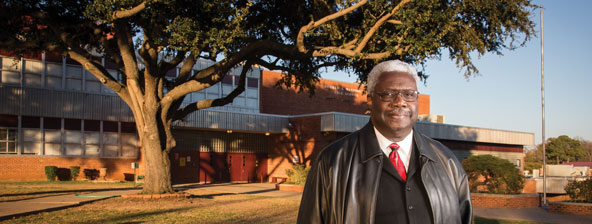
Carl Stewart stands in front of his high school alma mater in Shreveport, La. Photo by Kathy Anderson.
“My parents believed that education is the great equalizer,” Stewart says. “Our dad always looked at our conduct grade on our report card before he looked at anything else. He cared that we were smart and learning, but he cared most that we treated people with respect and kindness.
“My mom lived just long enough to see all three of her sons become lawyers,” he says. “She bragged about us at every opportunity. It was embarrassing.”
Richard became deputy general counsel at Verizon Communications in Irving, Texas. James is a judge on the Louisiana Court of Appeals.
“Whatever the Stewart parents were doing in raising their children should be bottled,” says Judge Catherina Haynes, who serves on the 5th Circuit with Stewart. “Carl’s brilliant legal mind is housed in a very nice, regular person. I’ve never seen any display of arrogance.”
Stewart graduated magna cum laude from Dillard University, a historically black college in New Orleans. He worked his way through law school at Loyola University College of Law as a security guard being paid minimum wage during his first year, and as an insurance claims agent for Allstate the following year.
“People involved in accidents would call and I would take their reports,” he says. “Nearly every night, one or more callers would use the N-word and tell me that all those people were liars.”
Never once did young Carl Stewart challenge the callers. He remained polite and did his job.
“Yes, it was hurtful,” he says. “But I have a lot more to be thankful for than I have to be bitter about. I simply don’t want to waste my time on revenge. Be kind to others, even when they are not kind to you, and you never know whose life you will change.”
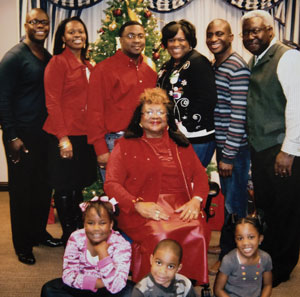
A Stewart family Christmas portrait. Photo courtesy of the Stewart family.
Judge King says that the way Stewart handled the antagonistic situations he faced while working at Allstate was “an early indication of the chief judge’s personal strength and character that he demonstrates every day on the court.”
TO MAKE A DIFFERENCE
Stewart says he decided to become a lawyer because he saw that lawyers “made a difference in the community, both in effecting social change and improving life in the community.”
Immediately following law school, Stewart joined the Army as a captain in the Judge Advocate General’s corps, where he served as a defense lawyer for soldiers at Fort Sam Houston in Texas.
After one year working for the Louisiana attorney general, Stewart joined the U.S. Department of Justice as an assistant U.S. attorney in 1979. During his four years as a federal prosecutor, he successfully pursued corrupt politicians, people trying to defraud the federal government and loan sharks. He received a letter of commendation from the attorney general for his work in civil rights cases.
In 1985, Stewart, after practicing law privately for two years, ran for a state judgeship. His political opponent, who was white, was so convinced that voters would not elect a black judge that he went on a fishing trip the week of the election and only learned later he had lost. Six years later, Stewart won election to the Louisiana Court of Appeals.
In 1994, President Bill Clinton appointed Stewart to the all-white 5th Circuit. He was only the second African-American to ever serve on the 5th Circuit. Judge Joseph Hatchett of Florida was appointed to the old 5th Circuit in 1979, but he went to the 11th Circuit at Atlanta when it was created in 1981.
Stewart was the only African-American on the 5th Circuit for 17 years. President Obama appointed Judge James Graves of Mississippi to the federal appeals court in 2011. “He’s amazingly fair and even-handed,” Judge Graves says, “which is good on a court with such strong personalities.”
Stewart’s temperate hand will be called on again during the next three years as the 5th Circuit is highly likely to witness significant changes in personnel and an accompanying shift in legal philosophy.
For two decades, the 4th and 5th Circuits were viewed as the most conservative in the nation. But during the past three years, the 4th Circuit at Richmond, Va., has shifted significantly toward the left on many issues, as six judges appointed by Obama took the bench.
By contrast, Obama has appointed only two judges so far to the 5th Circuit. Ten of the circuit’s 15 active judges were nominated by Presidents Reagan and George W. Bush, leaving the court solidly conservative.
“When I was appointed by President Reagan, I was one of the most conservative judges on the 5th Circuit,” says Higginbotham. “I don’t believe I’ve changed much, but I now find my side in the middle or sometimes left of center on this court.”
But the 5th Circuit now has three vacancies for Obama to fill, and as many as four more judges on the 5th Circuit are likely to seek senior status before the end of the Obama presidency.
“The chief judge has only one vote like the other judges, but Carl—because of who he is, his life experiences and his gift as a leader,” says Higginbotham, “will almost definitely influence the newer and younger judges who join the court.”
QUIET TEMPERANCE
Lawyers who regularly practice before the 5th Circuit say that Stewart’s temperament even makes its way into oral arguments. A great example occurred last spring when James Ho, a partner at Gibson, Dunn & Crutcher, asked a three-judge panel of the appeals court to reverse the lower court’s decision dismissing allegations brought by his client, Texas oilman T. Boone Pickens, that he had been defrauded by an insurance company.
Only 37 seconds into oral argument, Judge Jerry Smith interrupted Ho. “I’ve read the briefs and I know this already,” Smith said.
As Ho—who has argued several cases at the U.S. Supreme Court—tried to respond, Smith cut him off again and again. In fact, Smith interrupted Ho eight more times. “It was painfully clear that Judge Smith was not on my side from the start,” says Ho, who clerked for Judge Smith after law school.
During the argument, Stewart listened. He offered no comments and asked no questions, until the very end.
“Mr. Ho, here is my problem with your case,” said Stewart, offering up his concerns. “Why am I wrong?”
“As a lawyer, you cannot ask for more than that,” Ho says. “Stewart voted against my client, too, but he explained his issues with my case and he gave me a real opportunity to try to convince him otherwise.”
Ho and other federal appellate experts say they are frequently able to predict the outcome of 5th Circuit cases at the very moment that the names of the three-judge panel are announced a week prior to oral argument.
The reason, according to several lawyers who practice regularly before the 5th Circuit, is that most of the judges are so predictable and dogmatic in their viewpoints. Not so with Judge Stewart.
“Chief Judge Stewart is steady and fair; he’s a balls-and-strikes kind of judge, which is all you want in a judge,” says David Schenck, a partner with Dykema Gossett in Dallas and former appellate lawyer with the Texas attorney general’s office. “When I see Judge Stewart on a panel, I am never worried or stressed, no matter what side I’m representing.”
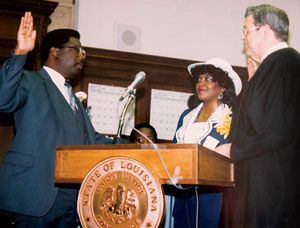
Stewart is sworn in as a judge of the 5th Circuit in May 1994 as his wife, Jo Ann, looks on. Photo courtesy of the Stewart family.
NO IDEOLOGUE
David Coale, an appellate law expert at Lynn Tillotson Pinker Cox in Dallas, says Stewart is very pragmatic in deciding cases.
“He never displays a preset agenda,” says Coale, who writes the blog 600 Camp about the goings-on in the 5th Circuit. “Chief Judge Stewart takes structure and procedure very seriously. He gives a lot of deference to trial court judges.
“Contrary to popular opinion, Stewart is no flaming liberal,” says Coale, “and the people who say that he is simply don’t follow his opinions.”
Stewart’s decision-making speaks for itself. The chief judge has voted on both sides of school prayer cases, which he says need to be examined in a very fact-intensive manner. He was on the three-judge panel that unanimously voted to uphold a Texas law banning Planned Parenthood’s participation in state health programs.
In 2012, he wrote the unanimous opinion in a case rejecting efforts by thousands of Hurricane Katrina victims seeking damages against the Federal Emergency Management Agency for allegedly housing them in toxic, formaldehyde-laden trailers. Judge Stewart’s opinion stated that the plaintiffs had no subject matter jurisdiction because the trailers were provided at no charge to them and with no obligation.
In May of last year, Stewart joined a unanimous opinion ending a case brought by Mississippi landowners claiming that emissions by several energy companies caused global warming that led to Hurricane Katrina and their property being damaged.
And records show that Stewart has voted to uphold death sentences more often than not, even though he has serious doubts about the fairness of most capital trials.
“It’s a shame that many of these cases cannot be touched because you know there’s something rotten in many of them,” he says. “But Congress passed and the president signed the Antiterrorism and Effective Death Penalty Act of 1996, and that severely limits what we can do. I may not like it, but it is the law and my job is to follow it.”
That statement, according to appellate lawyers for individual plaintiffs and big corporations, prosecutors’ offices and criminal defendants, is exactly why Stewart is an excellent judge.
Stewart had been on the 5th Circuit for only a year when Hopwood v. Texas came along. The three-judge panel had ruled against the University of Texas in the affirmative action dispute. Stewart was one of a handful of judges who thought the decision should be reviewed en banc.
“That was a tremendously difficult case for me because I was in the dissent,” he says. “It was a watershed moment for the court, especially because of the history of the 5th Circuit. I respect the opinion of the majority, but my real life experiences told me differently.
“No doubt, I identified with the issues raised,” he continues. “It is a case that stopped me in my tracks.”
Stewart may yet get his chance, as the Supreme Court remanded Fisher v. University of Texas, which examines the college’s affirmative action admissions policy, back to the 5th Circuit for review.
PERSUASIVE DISSENT
Then there’s the case of Billy Ray Nelson, a death row inmate convicted of sexually assaulting and killing his neighbor in Big Spring, Texas, in 1991. For more than a decade, the appeal bounced from court to court. The state appellate courts in Texas, the federal district judge and a three-judge panel of the 5th Circuit rejected defense lawyers’ arguments that the jury was not properly instructed to consider testimony that Nelson suffered from personality disorders that were the result of mistreatment when he was young.
The Supreme Court disagreed, reversed, remanded and instructed the appellate court to reconsider its ruling in light of its decisions in the Johnny Paul Penry murder case, in which the high court determined that the jury had not adequately considered Penry’s mental retardation as a mitigating factor at the sentencing phase of the trial.
A three-judge panel of the 5th Circuit, upon further review, unanimously reinstated Nelson’s death sentence. To be fair, state and federal district courts across the country interpreted Penry v. Johnson (2001) differently and struggled with its implementation.
But in the en banc review, Stewart wrote a 61-page opinion that reversed Nelson’s death sentence and, according to legal experts, provided the definitive road map for state and federal courts in determining whether juries give “full consideration and full effect” to mitigating evidence during the sentencing stage in capital trials.
According to other judges and former law clerks, Stewart’s opinion started as a dissent but eventually attracted the votes of eight of his colleagues.
Stewart declines to discuss the internal decision-making at the court, but he admits that the Nelson opinion is “my most memorable.”
“Carl writes very directly and simply,” says Judge King. “His opinions are actually readable, and because of that,” she says, “they have a stronger impact.”
In a stinging 58-page dissent, Judge Jones, writing for six judges, said Stewart’s entire opinion was wrongly based on an adjective—full—and would lead to more confusion. The Supreme Court left Stewart’s opinion undisturbed.
“Despite the horror of what Billy did, Judge Stewart went to bat to do what is right, even though the previous unanimous decision was against us,” says Rusty Wall, the Midland lawyer appointed to represent Nelson.
Don’t get the wrong idea. Wall is not your typical liberal criminal defense attorney. He identifies himself as a conservative and says he wishes there were “more Edith Joneses on the bench.”
“But in Billy’s case, Judge Stewart had a mighty ax to wield,” Wall says. “He stepped forward and said something is wrong here and we need to give this a second look. I don’t call that being liberal, I think that’s what it means to be a good judge.”
This article originally appeared in the February 2014 issue of the ABA Journal with this headline: “Meet Carl Stewart: He’s chief judge of the most divisive, controversial and conservative appeals court in the nation.”
Correction
In print and initial Web versions of our feature "Meet Carl Stewart," February, the author's account of an oral argument at the 5th U.S. Circuit Court of Appeals contained both a misimpression and a misstatement of fact. The article asserted that Judge Jerry E. Smith began a series of detailed questions after only 12 seconds of a scheduled 15-minute argument. The record shows that Judge Smith¹s questions began after 37 seconds. Moreover, the passage implied, unfairly, that Judge Smith's questions were unusual and impolite. Such questioning is not unusual in any appeals court, and the record shows that Judge Smith's questions, though persistent, were entirely civil.The ABA Journal regrets the errors.



